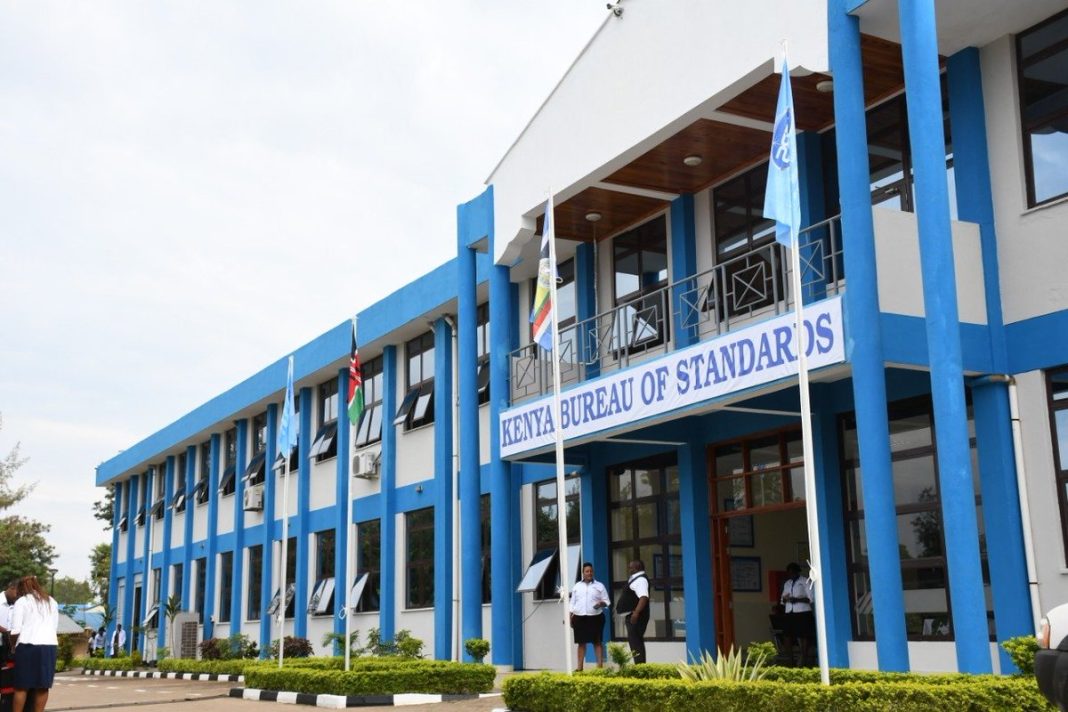The Kenya Bureau of Standards (KEBS) has moved to allay fears over alleged methanol poisoning risks, dismissing reports that Kenya is among countries facing danger from counterfeit or tainted alcoholic drinks.
In a statement issued on Wednesday, October 22, KEBS said it had taken note of the circulating media reports but assured Kenyans that there is no cause for alarm.
“The attention of the Kenya Bureau of Standards has been drawn to media reports on a directive that includes Kenya in a list of eight countries with the risk of methanol poisoning from counterfeit or tainted alcoholic drinks,” the agency stated.
KEBS clarified that all methanol available in Kenya is denatured using denatonium benzoate, one of the bitterest chemicals known, making it impossible to mistake for alcohol.
“KEBS would like to assure the public that all methanol in the country is denatured by adding denatonium benzoate, which makes its taste extremely bitter and unsuitable for human ingestion,” the statement added.
The bureau further noted that both locally produced and imported methanol must comply with established safety standards developed by its Industrial Solvents and Chemical Technical Committee. These include KS 2471:2013 (methanol for industrial use), KS 2582-1:2014 (safety of chemical products), KS 2583:2014 (denatonium benzoate test methods), and KS 2584:2018 (transport of dangerous goods).
“To prevent abuse, all consignments of methanol except those meant strictly for laboratory use must be denatured with denatonium benzoate,” KEBS explained. “When tested in accordance with KS 2583, all grades of methanol except laboratory-grade must contain not less than 8 ppm of denatonium benzoate.”
The agency emphasized that these measures are part of the certification and compliance checks before methanol is approved for industrial application in Kenya.
“The above standards guide the issuance of product certification marks and ensure methanol meets safety and quality requirements before use,” KEBS added.
This clarification comes just months after KEBS dismissed similar claims alleging that contaminated sugar had entered the local market. In July, the agency maintained that both imported and locally produced sugar undergo rigorous inspection and testing before being cleared for sale.
KEBS urged the public to rely only on verified information from credible sources and disregard unverified claims circulating on social media and other informal platforms.







us online casinos that accept paypal
References:
rejobbing.com
paypal casino canada
References:
https://diseotuweb-w9a.com/
Once your account is verified, use your credentials to log in (unless you’ve been automatically redirected back to the
casino after verifying your email). Once you open the casino’s official website, tap the register button and enter
the required information. Check our list and the awards assigned to
each casino to pick the best one based on your needs.
You won, mission accomplished, now it’s time to withdraw.
This really is just a way to have a bit more fun at the tables and to make your playing cash last
longer.
MiFinity is an e-wallet payment service that supports
deposits and withdrawals. It’s great if you’re a budget-conscious player, and it also provides anonymity.
Paysafecard is a prepaid voucher system that allows you to deposit funds
without requiring a bank account or card.
Australian online casinos offer a diverse range of games
to cater to various player preferences. The competition among these top Australian online casinos
ensures that players have access to innovative gaming experiences and generous rewards throughout 2025.
Australian online casinos for real money feature thousands of real
money games developed by the world’s leading providers.
The gambling sites we list are the best Australian online casinos that pay real money.
Aussie players can get the best payout rate by claiming real
money online casino no deposit bonus codes.
References:
https://blackcoin.co/crownplay-casino-majestic-gambling-for-australia/
The formidable Sydney Star casino. Sydney, a modern, cosmopolitan city
with life thriving in every nook and cranny. Although different gambling
laws are in place right across Australia, one thing is unchanging; the traditional and enduring Ozzie love of a wager.
Learn how setting a limit can add to a better gambling experience.
Register your details to be in the know for our latest news and offers.
Our in-house retailer offers a range of luxury
Crown products available for purchase, including a select range
of Crown linen and At Home products.
Queensland’s biggest Casino, The Treasury Brisbane is a glamorous
non-stop exciting gaming venue that has something for everyone.
It’s a luxurious gaming venue that’s beautiful inside and out and caters for low and high rollers.
We go through the rest of the casino’s features in our
guide.
Australia has 12 active casinos dotted all over the country, but largely focused around
capital cities and major regional hubs. In fact, you’re probably much safer in the average
casino near you than you are out on a typical city street,
in a department store, or even in most major airports!
We have even included the telephone numbers of the local Australian casinos, so you
can grab the phone and make a reservation today. Never again ask “Where is the best casino near me?
References:
https://blackcoin.co/top-online-casinos-in-australia-your-2025-guide/
venlo casino cashback bedingungen
References:
https://online-spielhallen.de/eine-ehrliche-bitkingz-casino-bewertung-meine-erfahrungen-nach-zehn-jahren-online-glucksspiel/
Bei SlotHunter besteht dieser aus einem match-up Bonus von bis zu 300 Euro und 200 Freispielen, verteilt auf die ersten beiden Einzahlungen. Von klassischen Slots bis hin zu progressiven Jackpot-Spielen, Tischspielen und Live-Casinospielen – die Möglichkeiten sind nahezu
unbegrenzt. Wenn Sie nicht gerne Spielautomaten spielen, auf die sich dieses Casino
stark verlässt, sollten Sie andere neue Online-Casinos überprüfen und dasjenige
finden, das Ihren Spielbedürfnissen am besten entspricht.
Da SlotHunter ein mobiles Sofortspiel-Casino ist, können Sie Ihr
Konto eröffnen und Spiele in wenigen Minuten spielen, ohne einen Desktop-Computer zu verwenden. Viele Spielautomaten sind jedoch für
das Bonusspiel gesperrt, daher sollten Sie sich in den Allgemeinen Geschäftsbedingungen informieren,
welche Spielautomaten nicht mit Bonusgeld gespielt werden können, bevor Sie anfangen zu spielen.
Darüber hinaus bietet SlotHunter sowohl VIP- als
auch Loyalitätsprogramme, die viele Anreize für treue und wettbewerbsfähige Spieler bieten. Die SlotHunter-Webseite sieht auf Mobiltelefonen besonders schön aus und
bietet eine hervorragende Leistung und Spielerfahrung auf Reisen, beim Pendeln oder einfach beim Genießen der
Natur. SlotHunter Casino bietet einen reaktionsschnellen Kundenservice,
der rund um die Uhr über Live-Chat und E-Mail-Support-Kanäle verfügbar ist.
References:
https://online-spielhallen.de/frumzi-casino-deutschland-ein-umfassender-uberblick/